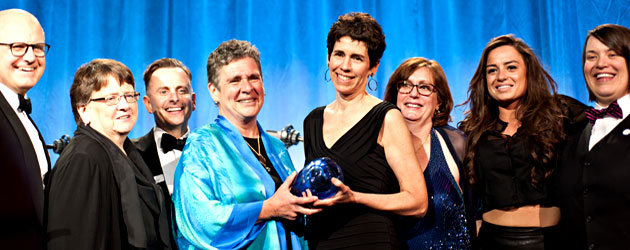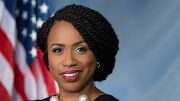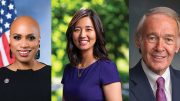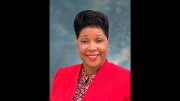
Annual 2014 Fenway Women’s Dinner Party attendees having a blast!
Photo: The Rainbow Times/Alex Mancini
Click here for complete photo coverage
By: Chuck Colbert/TRT Reporter—
BOSTON, Mass.—“You are the happiest crowd I’ve ever seen,” comedian and emcee Kate Clinton told more than 1,100 attendees at the 23rd annual Women’s Dinner Party, one of Fenway Health’s signature fundraisers and one of the LGBT community’s largest affairs in New England. “Are you having a good time schmoozing and cruising? Anybody get lucky?”
Altogether, the 2014 Women’s Dinner Party, an evening gala of dinner and dancing, raised more than $500,000 in cash, pledges and in-kind support. The event was held Saturday, March 29 at the Boston Marriott Copley Place and drew a number of politicians, including Boston Mayor Martin J. “Marty” Walsh, as well as any number of other elected officials, including U.S. Representative Niki Tsongas, and Senators William N. Brownsberger and Sonia Chang-Diaz, as well as state Representatives Elizabeth A. Malia, Carl M. Sciortino, Jr., and Gloria L. Fox. Rhode Island state Representative Deborah Ruggiero was also on hand.
Boston City Councilors Matt O’Malley, Ayanna Pressley, Jeffrey Sanchez, Michelle Wu, Josh Zakim, and Tito Jackson attended the dinner party, along with Cambridge City Councilor E. Denise Simmons. Maura Healey, openly gay candidate for Massachusetts attorney general, also mingled among dinner party attendees. Felix Arroyo, director of Boston’s new Department of Health and Human Services, also attended. Arroyo is a former city councilor.
In his remarks Mayor Walsh praised Fenway Health. [pullquote]In accepting the honors, Cherry spoke about a straight woman in small town Texas, Candy Purl, who welcomed into her home a young man who would go on to become a National Football League prospect. At the time, Purl had no idea the young man—Michael Sam—would one day come out as a gay man ahead of the NFL draft.[/pullquote]
“It’s a global leader in healthcare for the LGBTQ community that’s an important [presence] here in the City of Boston,” said Walsh.
Fenway, he went on to say, “Not only keeps our residents healthy, but it brings great benefits to the entire city by helping us attract and retain a vibrant and talented workforce that’s a huge advantage for us in our mission to become leaders in the innovative economy and arts culture here.”
Timothy Harwood, vice president of development at Fenway Health, shared in an e-mail interview with The Rainbow Times how the Women’s Dinner Party was created and how it has evolved into the event it is today.
“The first Women’s Dinner Party was the brainchild of Deborah Heller and friends and was held in 1992 at the South End’s Boston Ballet School as a fundraiser for Fenway Health,” Harwood said. “Many gay men volunteered their time to help make the event a success and as a thank you to the lesbians and bisexual women who had done so much to help them during the darkest days of the AIDS epidemic. The event has grown from there to include more than a thousand lesbian and bisexual women and transgender people and their friends and supporters and is one of the largest LGBT fundraisers in New England.”

Boston Mayor Martin J. Walsh in attendance at the Women’s Dinner Party 2014.
Photo: The Rainbow Times/Alex Mancini (c)
Harwood said the funds raised at The Women’s Dinner Party and the Men’s Event support care and services provided by Fenway, including many women’s health programs and healthcare for people who are still living without insurance and can’t afford to pay for it themselves.
A highlight of the evening was honoring longtime LGBT community leader Elyse Cherry of Brookline with the Dr. Susan M. Love Award. Fenway chose Cherry, chief executive officer of Boston Community Capital (BCC), for her longstanding commitment to economic justice and equality and for concern for health equality for women and families throughout the city and state. In Cherry’s 16 years as CEO, BCC has invested in child care facilities serving nearly 10,000 children and healthcare facilities providing care to over 66,000 patients.
Under her leadership, BCC created innovative solutions to challenges faced by residents of low-income communities in Massachusetts and nationally. By providing better access to affordable and reliable housing, healthcare and child care, BCC helps provide low-income people, the majority of whom are women, with the freedom they need to seek educational and employment opportunities that will help break the cycle of poverty. [pullquote]“The first Women’s Dinner Party was the brainchild of Deborah Heller and friends and was held in 1992 at the South End’s Boston Ballet School as a fundraiser for Fenway Health,” Harwood said. [/pullquote]
As an LGBT community leader, Cherry served on the board of directors at Gay & Lesbian Advocates & Defenders. For a time during the same-sex marriage battle on Beacon Hill (2004 – 2007), Cherry was board president of MassEquality. Now, she serves on the board of The Lesbian Super PAC, a political action committee dedicated to the goal of “influencing elections by giving lesbians a meaningful seat at the political table,” according to its mission.
Each year at the dinner party, Fenway presents the Dr. Susan M. Love Award to honor and celebrate a woman and/or organization that has made a significant contribution to the field of women’s health. The award is given in honor of its founding recipient, Dr. Susan M. Love, a pioneer in the fields of women’s health and breast cancer. Love helped found the Revlon/UCLA Breast Center in 1992 and currently heads up the Dr. Susan Love Research Foundation, which is dedicated to eradicating breast cancer. Past recipients include Lily Tomlin, U.S. Senator Tammy Baldwin (D-Wisconsin), and Urvashi Vaid, among others.
In introducing Cherry, state Representative Malia noted Cherry’s role in protecting marriage equality at the time.
“The reason we [did] it was because of leaders like Elyse, who was working in the background and really made the job much easier for all of us,” said Malia, who serves among only a handful of openly gay state lawmakers.
Malia also praised Cherry for her work in forestalling some of the devastating effects that the recent foreclosure crisis wreaked on homeowners.
“The work she has done has literally kept people in their homes and has changed a lot of lives,” said Malia.
In accepting the honors, Cherry spoke about a straight woman in small town Texas, Candy Purl, who welcomed into her home a young man who would go on to become a National Football League prospect. At the time, Purl had no idea the young man—Michael Sam—would one day come out as a gay man ahead of the NFL draft.
“I’ve been thinking about why I was sufficiently moved by Candy Purl’s story to share it with you tonight,” said Cherry. “Some may say Purl engaged in an extraordinary act, and she did. But what I found most moving is that Candy Purl engaged in a perfectly ordinary act. What Candy Purl did is what women do—what lesbians do—every single day. We build families that some might call non-traditional. We reach across the potential divides of class and culture and race and sexual orientation and, like Candy Purl, we set another place at our table.
“But it was not always so. Our ability to reach out to our friends and neighbors, to welcome others into our homes—to provide sanctuary, for example, to a young man from a troubled family—was limited by the secrecy that of necessity ruled our lives—because our very identity could be cause for criminal prosecution. ‘Monday morning pronouns’ were the order of the day as those of us who were gay and lesbian engaged in conversation with our co-workers without revealing the gender of our intimates. Our community remained hidden. Even finding community was a challenge.
“By claiming our identity as lesbians—by coming out as a community—we opened our lives to our friends and neighbors and families, and we caused a sea [of] change across our nation. Coming out became a rite of passage, a way not just to claim our own identity but also to remove the cloak of invisibility that separated us from our straight friends and family and neighbors.
“Our world changed because we changed it.” [pullquote]“Women’s health is about more than our bodies,” she said. “It’s about more than healthy minds. It’s even about more than a healthy spirit. Women’s health is about the health of our planet and the souls who make their lives here. Women’s health is about building the world we want—a world in which justice and equality are a given rather than a goal, in which women and all of the beings we love have what we need not just to live but also to thrive, a world in which we are all Candy Purl.”—Elyse Cherry[/pullquote]
In her remarks, Cherry also framed a broader context for women’s health.
“Women’s health is about more than our bodies,” she said. “It’s about more than healthy minds. It’s even about more than a healthy spirit. Women’s health is about the health of our planet and the souls who make their lives here. Women’s health is about building the world we want—a world in which justice and equality are a given rather than a goal, in which women and all of the beings we love have what we need not just to live but also to thrive, a world in which we are all Candy Purl.”
Reaction to Cherry’s remarks was uniformly enthusiastic.
“Her speech was heartfelt, perfectly delivered with wonderful rhetoric,” said Carol Tye, Cherry’s honors sophomore high school (Revere, Mass.) English teacher. “It had a connection to everyone in this room. That’s been the story of Elyse’s life—connection to everyone.”
For more information about the Women’s Dinner Party and the women’s health services provided by Fenway Health, visit www.fenwayhealth.org.
[Click here for TRT’s complete Photo Coverage]








Love the article! When is the next Women Dinner Party???